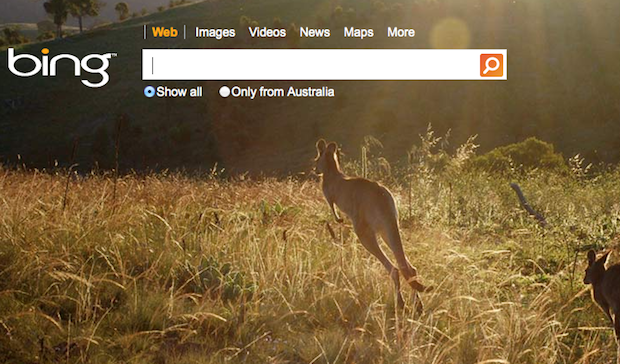Bing Aus out of beta but no new hires yet

Bing, Microsoft's search engine, has dropped the beta tag for Australian users after two years of localisation work from the Sydney-based development team, but the search engine's Australian outpost has revealed that there will be no new hires into the business just yet.

Bing Australia, now with kangaroos
(Screenshot by Luke Hopewell/ZDNet Australia)
Bing's Australian team of developers sits at between eight to 15 staff, working to localise search results for the Australian market. Sports results, weather, events and places are all localised by Bing's Australian team. The company told ZDNet Australia yesterday, however, that 15 staff is where the team is likely to stay for now.
"At the moment we'll definitely keep it as it is. Australia's certainly put a lot of work into [localising Bing] on the basis that we see the opportunity with all our partner businesses. I think it's fair to say that we wouldn't be looking at the expansion," said Kurt Fulepp, Bing Australia product specialist, adding that Bing's Australian team has the unique benefit of having access to content from ninemsn, which is all prepared locally on the same premises.
Bing Australia also displays content from Microsoft's myriad of other partnerships, including mapping information from Navteq and Nokia, Yahoo7! and HWW.
Overseeing the local launch of Bing Australia is Stefan Weitz, senior director of Bing Search USA, who believes that the current voice search capabilities in the market today are little more than novelty-based party tricks.
Apple and Google have both been hyping their voice capabilities in Australia for the last few months. Apple released its voice assistant, Siri, with Australian voice recognition, while Google has been promoting Voice Search by travelling to the middle of the desert and to the bottom of the ocean just to test it.
Weitz, however, is unconvinced by voice commands and existing voice-based searching.
"Voice is important but I will say that it tends to be ... almost a parlour trick. The translation of voice to text is getting a lot better, but honestly, the use cases for that can look great in demos but rarely work very well outside of demos," he said.
"I've used Siri, and it's an absolutely beautiful piece of tech, but back in the old days, before Apple bought [Siri] you could actually sit there and use it with your finger, for example, [as opposed] to yelling at your phone in the hope it understands you, or in the office with a little microphone in the Chrome browser, [sitting] in a cube farm yelling at your browser to search."
Weitz said Microsoft is working on a voice-based search that can go beyond just a party trick. He said that his team is working internationally on intent-based searching — the idea that a machine can identify not only what a user's command is, but the intent behind the command. This means that a task is not only done right the first time, but it's done using true natural language.
"The more interesting thing beyond voice is intent and that's what we're working on right now. There are tonnes of company's like Nuance who do a very good job with voice recognition. We have a very good voice recognition engine as well. But just getting the words is interesting, but not the fun part. The fun part is getting the words like 'I want to go to the pub' [and translating that]. I understand what you're saying there but computers have no idea what you're saying. The fun part actually is to say 'OK, we have to understand the world and the semantics of the language'. So when you say 'I want to go down to the pub this evening', you'll have to look at the fact that this evening means tonight and a pub is also a bar, a bar is near you based on this radius at which you're broadcasting and actually having the systems to be smart enough to understand what you're saying then execute," he said.
"Don't think of it as a query anymore, think of it as a request. The request gets sent to the system, the request gets brokered out into different objects and then pushed back as a result. That's where the fun is now: the intent derivation of the request. That's where we see Bing going," Weitz added.
Raising the curtain on Bing Australia
Weitz said that while Microsoft is looking to challenge Google in the local search stakes, but won't use its customers as beta testers like Google does.
"We like to present a fit-and-finished presentation," Weitz said of Microsoft-branded products, but assured that "we're always changing behind the scenes".
Weitz expressed unease at using customers as beta testers and stood by the company's desire to only release products that had been meticulously perfected.
"Isn't [it] messed up?! That we see 'behind the curtain' and go 'well that's OK'," he exclaimed. For an application or a feature to really do well, he said, it needs to be eye-catching and executed perfectly.
"I personally find using customers as beta testers long-term a bit odd. Especially those who are more used [to] now — like younger people — to visual things. Things that are very tight like all the iPad apps you see out there today. They aren't crufty, they aren't half-finished, they're the beautiful ones," he said.